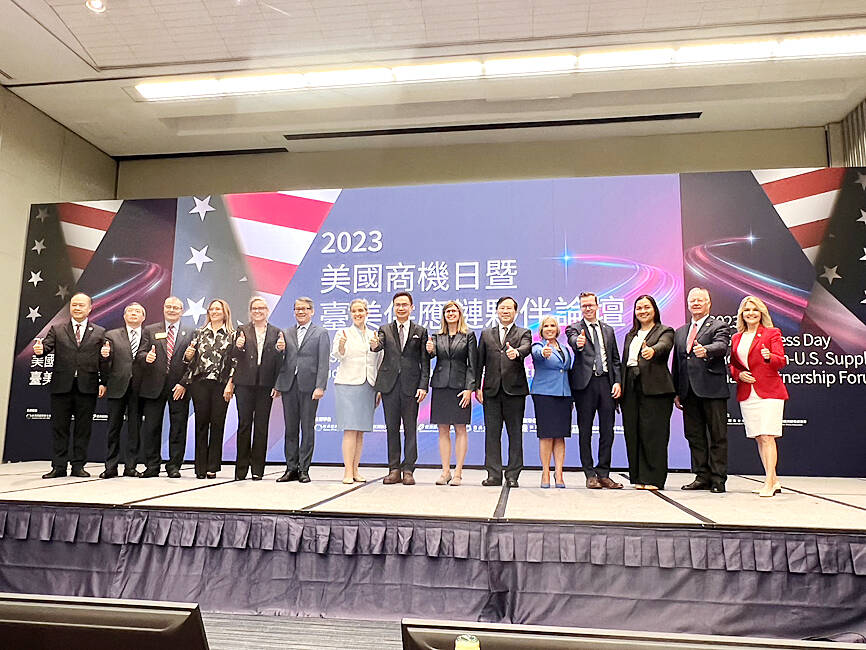The Ministry of Economic Affairs, the Taiwan External Trade Development Council (TAITRA), the American Institute in Taiwan (AIT) and the American State Offices Association yesterday jointly held the US Business Day investment forum at the Taipei International Convention Center as both sides gear up for more business opportunities together.
Deputy Minister of Economic Affairs Lin Chuan-neng (林全能) said in opening remarks that the Taiwan Strait issue has been a focus of global security, but foreign businesses still have confidence in Taiwan’s market, as companies such as Applied Materials Inc, ASML Holding NV and Merck Group continue to invest here.
“Taiwan is indeed a trustworthy partner in the global supply chain,” Lin was quoted as saying in a statement released by TAITRA.

Photo: Lin Jin-hua, Taipei Times
Taiwan and the US continue to strengthen economic and trade cooperation based on shared values, TAITRA chairman James Huang (黃志芳) said in the statement.
For example, US President Joe Biden last month signed into law a bill that approves the first agreement negotiated under the US-Taiwan Initiative on 21st-Century Trade, which is proof of the trust and cooperation between Taiwan and the US over the past decades, Huang said.
AIT Director Sandra Oudkirk was quoted as saying at the forum that bilateral investment between Taiwan and the US in the semiconductor, electric vehicle and 5G industries would help increase employment and economic growth on both sides, and boost cultural exchanges and business opportunities.
Many US states have established offices in Taiwan over the past three years, amid a closer relationship between Taiwan and the US, Oudkirk said, adding that 18 US companies, including Super Micro Computer Inc, attended the investment forum.
Last year, Taiwan was the US’ ninth-largest trading partner, while the US was Taiwan’s second-largest, as well as one of its most important sources of foreign direct investment and technological input, the TAITRA statement said.
This year, more than 200 Taiwanese businesses, including Lite-On Technolgy Corp (光寶科技), Compal Electronics Inc (仁寶電腦), Aerospace Industrial Development Corp (漢翔航空), Teco Electric and Machinery Co (東元電機) and Sinbon Electronics Co (信邦電子), attended the event to engage in one-on-one business meetings with US companies, it said.
Arizona Governor Katie Hobbs, who led a delegation to Taiwan for the forum, said in a speech at the event that her state is expecting more opportunities to cooperate with Taiwanese businesses following a spate of investment by firms in the Taiwanese semiconductor supply chain.
New Mexico Governor Michelle Lujan Grisham, who was also heading a delegation, spoke of the economic diversity of her state, with industrial investments focusing on green energy related to the hydrogen, aerospace, smart manufacturing, electric vehicle, information security and tourism sectors.

TAKING STOCK: A Taiwanese cookware firm in Vietnam urged customers to assess inventory or place orders early so shipments can reach the US while tariffs are paused Taiwanese businesses in Vietnam are exploring alternatives after the White House imposed a 46 percent import duty on Vietnamese goods, following US President Donald Trump’s announcement of “reciprocal” tariffs on the US’ trading partners. Lo Shih-liang (羅世良), chairman of Brico Industry Co (裕茂工業), a Taiwanese company that manufactures cast iron cookware and stove components in Vietnam, said that more than 40 percent of his business was tied to the US market, describing the constant US policy shifts as an emotional roller coaster. “I work during the day and stay up all night watching the news. I’ve been following US news until 3am

UNCERTAINTY: Innolux activated a stringent supply chain management mechanism, as it did during the COVID-19 pandemic, to ensure optimal inventory levels for customers Flat-panel display makers AUO Corp (友達) and Innolux Corp (群創) yesterday said that about 12 to 20 percent of their display business is at risk of potential US tariffs and that they would relocate production or shipment destinations to mitigate the levies’ effects. US tariffs would have a direct impact of US$200 million on AUO’s revenue, company chairman Paul Peng (彭雙浪) told reporters on the sidelines of the Touch Taiwan trade show in Taipei yesterday. That would make up about 12 percent of the company’s overall revenue. To cope with the tariff uncertainty, AUO plans to allocate its production to manufacturing facilities in

Six years ago, LVMH’s billionaire CEO Bernard Arnault and US President Donald Trump cut the blue ribbon on a factory in rural Texas that would make designer handbags for Louis Vuitton, one of the world’s best-known luxury brands. However, since the high-profile opening, the factory has faced a host of problems limiting production, 11 former Louis Vuitton employees said. The site has consistently ranked among the worst-performing for Louis Vuitton globally, “significantly” underperforming other facilities, said three former Louis Vuitton workers and a senior industry source, who cited internal rankings shared with staff. The plant’s problems — which have not

COLLABORATION: Given Taiwan’s key position in global supply chains, the US firm is discussing strategies with local partners and clients to deal with global uncertainties Advanced Micro Devices Inc (AMD) yesterday said it is meeting with local ecosystem partners, including Taiwan Semiconductor Manufacturing Co (TSMC, 台積電), to discuss strategies, including long-term manufacturing, to navigate uncertainties such as US tariffs, as Taiwan occupies an important position in global supply chains. AMD chief executive officer Lisa Su (蘇姿丰) told reporters that Taiwan is an important part of the chip designer’s ecosystem and she is discussing with partners and customers in Taiwan to forge strong collaborations on different areas during this critical period. AMD has just become the first artificial-intelligence (AI) server chip customer of TSMC to utilize its advanced